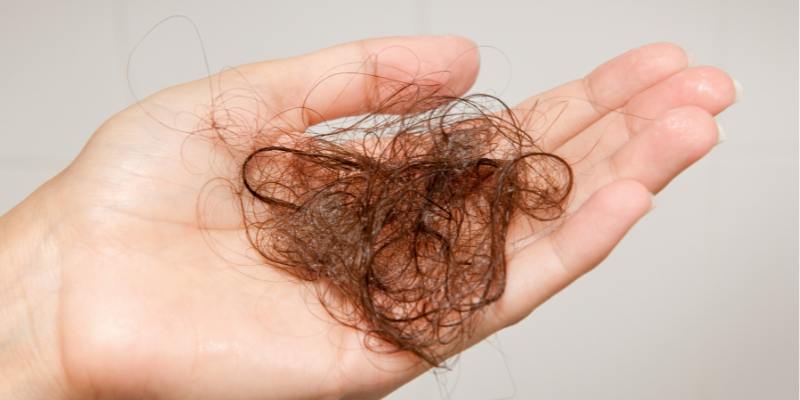Lupus is a chronic autoimmune disease affecting many body parts, including the skin and scalp.
Hair loss is a common symptom of lupus, and it can be a significant source of emotional distress.
This blog post will explore the reasons behind hair loss in lupus, offer coping strategies, and remind you that you're not alone in this journey.

Why Does Lupus Cause Hair Loss?
Lupus disrupts your body's immune system, causing it to attack healthy tissues. In the case of hair loss, this can happen in two ways:
- Inflammation: Lupus-related scalp inflammation can damage hair follicles, leading to hair thinning and shedding.
- Scarring: Discoid lupus, a type of lupus that affects the skin, can cause scarring on the scalp. This scarring can permanently destroy hair follicles, preventing hair growth in those areas.
The Different Faces of Lupus Hair Loss
Hair loss in lupus can manifest in several ways:
- Diffuse thinning: The most common type, causing hair to thin all over the scalp.
- Patchy hair loss: May occur in circular patches resembling alopecia areata, another autoimmune condition.
- Receding hairline: Hair loss may be more prominent at the hairline, mimicking male or female pattern baldness.
Coping with Hair Loss: Strategies for Inner and Outer Strength
Hair loss can be emotionally challenging. Here are some tips to navigate this aspect of living with lupus:
- Talk to your doctor: Discuss your hair loss concerns and explore treatment options like topical medications or scalp injections to stimulate hair growth.
- Explore different hairstyles: Consider shorter styles, wigs, scarves, or hats to feel more confident and comfortable.
- Focus on scalp health: Maintain a gentle hair care routine, use lukewarm water when washing your hair, and avoid harsh styling products.
- Embrace self-care: Prioritize activities that make you feel good, like getting enough sleep, managing stress, and eating a healthy diet.
- Connect with others: Join online support groups or connect with people with lupus. Sharing your experiences can be incredibly validating.

Hair Loss Help from Wig Medical
Our expert team of certified cranial prosthesis specialists is meticulously trained to ensure a perfect fit for your wig.
A medical wig translates to a natural-looking solution that empowers you to feel your best.
We boast a diverse selection of high-quality medical wigs, offering a variety of styles, materials, and colors to cater to your unique needs and preferences. Navigating insurance coverage for wigs can be complex.
However, our team possesses the expertise to guide you through the process, maximizing your coverage potential.
Most importantly, we prioritize personalized care and support throughout your experience. We actively listen to your concerns, address your questions, and provide expert guidance every step of the way.
At Wig Medical, we believe hair loss shouldn't define you.
We empower you to reclaim your confidence and rediscover your beauty. Explore our comprehensive wig selections online, schedule a complimentary consultation with a certified specialist today, or contact us to learn more.
Contact a team member today to learn more about your customizable options!
What is lupus, and how does it cause hair loss?
Lupus is a chronic autoimmune disease in which the immune system attacks healthy tissues, including the skin and hair follicles, causing inflammation.
This inflammation can result in hair thinning or significant hair loss, known medically as lupus hair.
Hair loss may be diffuse or occur in patches and can be exacerbated by the disease itself or as a side effect of medications used for treatment, such as corticosteroids.

Are there specific signs of hair loss associated with lupus?
Yes, lupus-related hair loss often differs from other types of alopecia. It can be mild, causing hair to thin or more severe, leading to bald patches.
Another distinct symptom can be "lupus hair," where hair at the hairline becomes brittle and breaks off, which might give hair a ragged appearance.
Additionally, discoid lupus lesions on the scalp can lead to scarred areas where hair cannot regrow.
Can lupus hair loss be reversed?
Hair loss from lupus can sometimes be reversible, mainly if it's caused by medication or is linked to a flare-up of the disease.
Effectively managing the underlying lupus can lead to hair regrowth, although it might take time. In cases where scarring has occurred on the scalp, hair loss might be permanent.
It's essential to consult with healthcare providers to adjust treatment plans that might contribute to hair loss.
What treatments are available for lupus-related hair loss?
Treatment focuses on controlling lupus activity to minimize its impact on the hair and scalp.
This can involve:
- Adjusting lupus medications to avoid those that might contribute to hair loss.
- Topical treatments such as minoxidil are used to encourage hair growth.
- Corticosteroid injections into the scalp to reduce localized inflammation.
- Immunosuppressive drugs in severe cases to manage the disease.
- Good scalp care to avoid irritations that could worsen hair loss.

Can I wear a cranial prosthesis if I have lupus?
Yes, cranial prostheses, or medical wigs, are highly recommended for individuals with lupus experiencing significant hair loss.
These prostheses can help manage the emotional and psychological stress associated with hair loss.
Choose a lightweight, breathable wig that does not irritate the scalp. Custom-designed wigs that consider sensitive areas and provide a comfortable fit are ideal.
Maintaining good wig hygiene is also vital to prevent scalp issues.

